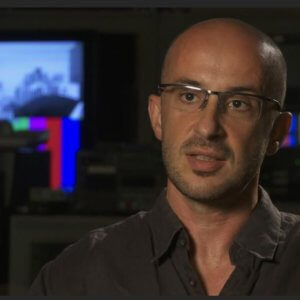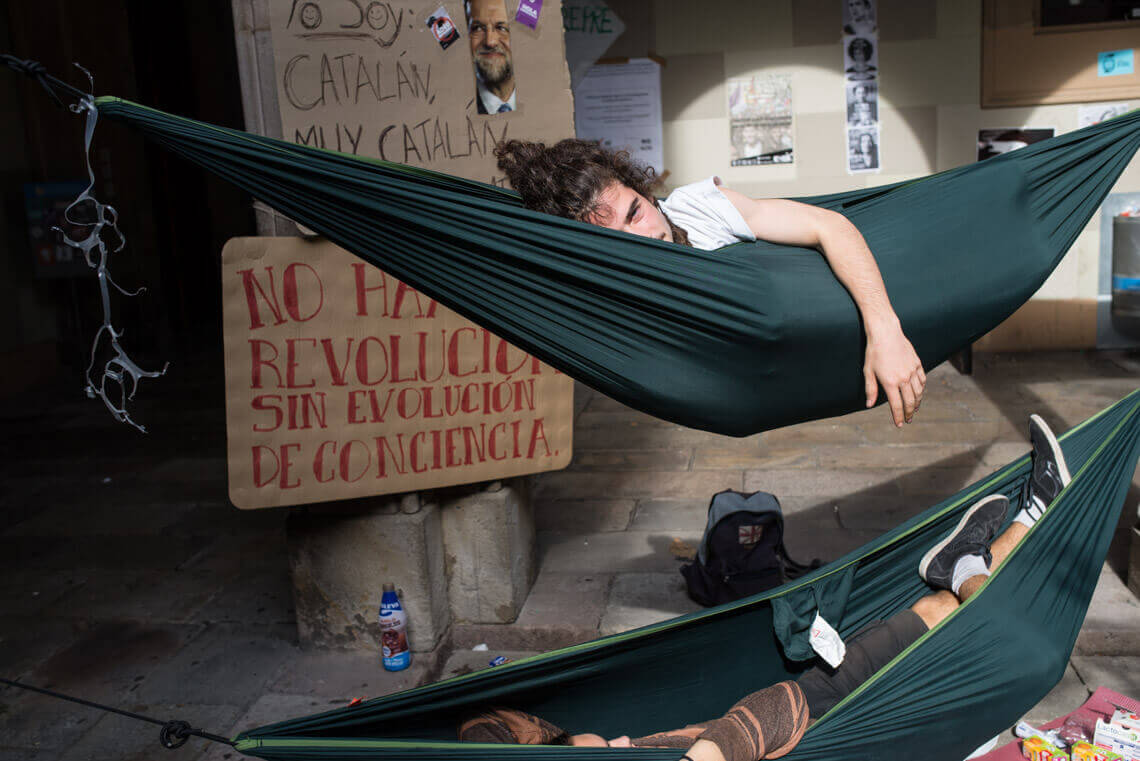Spain is experiencing its worst political crisis in decades. Could you briefly summarise why and how the situation in Catalonia has escalated to this point?

For over ten years the Spanish government has neglected Catalonia’s attempts to improve its own regional government. Add to this the economic crisis, massive corruption cases in both Spain and Catalonia, social welfare cuts, and anti-democratic laws like the new security law or “gag law”. Then, on top of all this you have an incredibly unprofessional and irresponsible media environment with politicians manipulating on both sides, playing with peoples’ emotions and creating illusions. The struggle for independence is the perfect smoke-screen to make the population care only about carrying their flags and shouting, eventually even fighting each other instead of demonstrating against massive corruption. If the Spanish government had accepted the deal that had been approved in Catalonia in 2006 or had accepted a legal referendum like in Scotland or Quebec, we would not have the problem we are facing now.
Why does Catalonia want independence from Spain? When we were in Barcelona, people often claimed that Catalonia is rich and they don’t want to pay for the poorer Spanish regions. They also complained about decades of Spanish oppression and so on.
Oppression is a very strong word. Catalonia is not Palestine or the Western Sahara. But the People’s Party has always used hate speech against Catalonia for electoral reasons. Catalonia has its own history and language with its own parliamentary tradition, actually one of the oldest in the world. At the same time Catalans have been living in Spain for a long time in a peaceful and very natural coexistence, with two languages and cultures. It is true that historically Catalonia has suffered repression and various abuses from Spain, but this is largely to do with the eternal conflict of the ‘Two Spains’ that we still can see so clearly today: the democratic, open minded, republican left-wing Spain and the right-wing conservative, monarchist Spain that owes much of its heritage to the Franco regime. Of course in addition to this there is a silent majority that just wants to live a peaceful and democratic life. But as more tension is created and society becomes more polarised, it will be difficult to remain in the middle and not to take sides. Unfortunately I am afraid that now we are going to see a real oppressive situation.
What are the characteristics of Catalan nationalism? Is it appropriate to say that Catalan nationalism is left-wing, or is this a false assumption?
Catalan nationalism has many different characteristics. There are those that feel Catalan, but don’t want independence. Others are neoliberal and conservative but want independence, and then there are those that want independence and are nationalist, but with a strong republican or socialist ideology. They see this process of independence as a chance to make a revolution and create a new model of democracy with strong social values.
The brutality of the Spanish police in Catalonia has been shocking. Hundreds of people were injured last week and the secretary to the vice-president was arrested. How is the situation now?
Tensions are rising fast. The King’s message, which I expected to be more reconciliatory, was shockingly strong against the Catalan people who are only requesting to have the chance to vote yes or no in a referendum. It was totally one sided! The Spanish government has become a kind of machine for creating support for independence. Lots of the police and Guardia Civil, the paramilitary force, are behaving in an incredibly unprofessional way, covering their vehicles with Spanish flags as if they were an occupying force. Unfortunately the King’s message did not help. Instead of calming things down, his speech created even more division and polarised society even more. Now this conflict has become a clash between Spanish pride and Catalonian dignity.
The Catalan referendum will not be legal, but we need to defend it anyway
It would seem that after this police violence, even more people in Catalonia would want independence. Is it really possible to retain Catalonia under the Spanish rule?
The scariest thing is that it is very difficult to imagine a solution or a way out from this problem.
On the other hand, don’t you think it is useless to build a new nation-state in Catalonia in times like these? This would probably bring more fragmentation, and not only among the left wing forces…
Both democracy and the capitalist system are in decay and I have a sense that step by step in all Western societies our basic rights and social welfare are being cut and lost. If the independence process had been done differently, by both sides, there could have been a chance to recover and upgrade the model of Western democracy. But both sides made bad choices or failed to consider the consequences of their actions, or they were just focused on distracting attention from political corruption. The hopes and demands of the people and civil society movements is one thing, another thing entirely is how politicians and the media take over and distort this.
What do you expect to happen in the next couple of weeks? Do you think there is the possibility of a new independence referendum ? Or perhaps a kind of a compromise between the Catalan and central governments?
The wisest thing would be to negotiate and organise a legally recognised referendum like that which happened in Scotland. Unfortunately, the Spanish government does not want to negotiate and I am afraid there will be a crack down on the leaders of the independence movement. Perhaps some political parties will be banned and declared illegal. Detentions, fines, and court trials will occur. This will create even more tension and more division.

Do you expect the EU to intervene, with sanctions for example?
Spain has created this problem by not negotiating. The Catalan pro-independence movement and its politicians chose to go ahead with the referendum. Their mistake is that in recent years, there has been a media campaign of victimisation where the referendum has been sold as the solution to all the problems that in fact all of Europe is struggling with. The roadmap for the referendum and independence was not realistic nor was it presented in a responsible way. It’s one thing to offer a referendum based on self-determination, for everybody to participate regardless of how they vote. But it is something entirely different if you bombard society, constantly using public media to promote the idea that the referendum will be our way out from “oppression”, to talk about historical battles and struggles in a romantic way, without talking about what the actual plan is. Or if you assure people independence will come without consequences, social division, or violence.
A part of Catalan society feels frustrated, tired of the hate speech, corruption, and Spain’s infamously dirty politics, but it was not suffering an occupation like that in Palestine or oppression like the Rohingya. Unfortunately if we do not find a solution in the coming days, we will see images both sides might regret at some point. It is very sad and disturbing that things I’ve seen in so many war-torn countries are now starting to happen in my home.
**
This interview originally appeared in A2larm.cz.
Featured image by Jakub Szafranski.
![Political Critique [DISCONTINUED]](https://politicalcritique.org/wp-content/uploads/2015/09/Political-Critique-LOGO.png)
![Political Critique [DISCONTINUED]](https://politicalcritique.org/wp-content/uploads/2015/09/Political-Critique-LOGO-2.png)